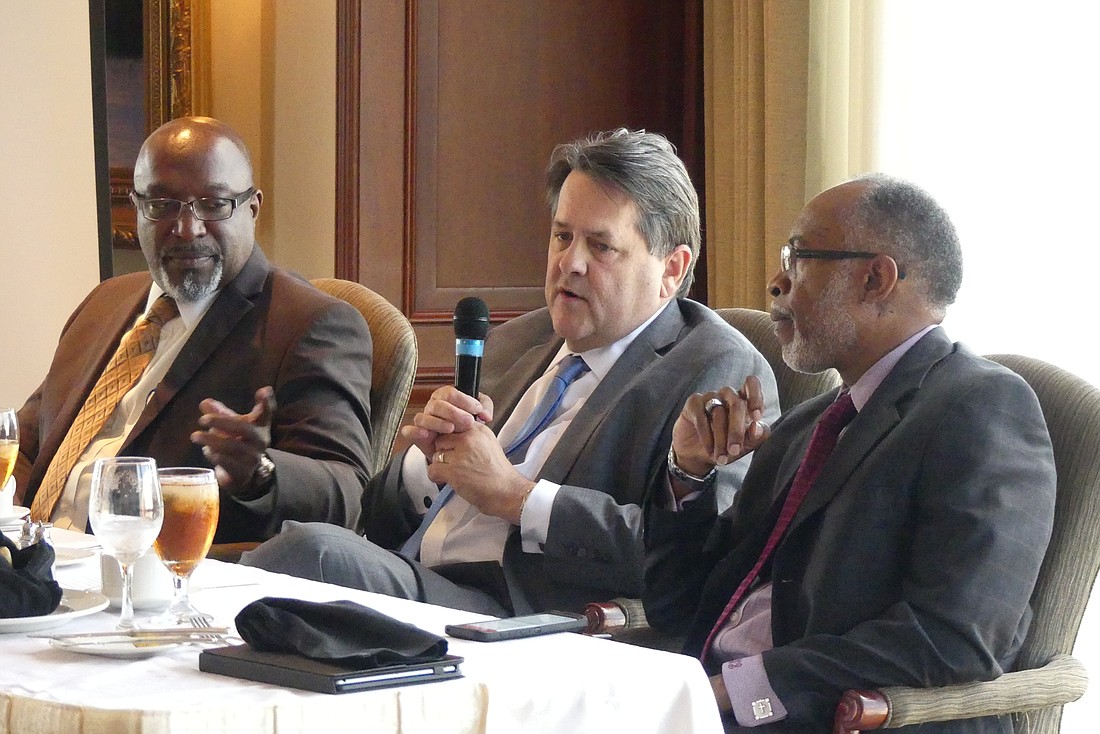
In Florida, there are two ways to become a judge: mount a political campaign for the office and win the election or apply to the commission that evaluates candidates and then submits nominees to the governor, who selects an appointee.
The process to be appointed to fill a judicial vacancy was the topic of a panel discussion when the D.W. Perkins Bar Association met last week at The River Club.
The panel comprised attorneys A. Wellington Barlow, Dexter Van Davis and Charles McBurney.
Barlow and Davis are former members of the 4th Circuit Judicial Nominating Commission. McBurney is a member of the Florida Federal Judicial Nominating Commission.
The discussion was general in terms of procedure and specific in terms of efforts to ethnically diversify the judiciary.
There are 27 judicial nominating commissions in Florida: one for each of the 20 judicial circuits, one for each of the five appellate districts and one each for the Supreme Court and the Statewide Nominating Commission for Judges of Compensation Claims.
Davis said when he served on the commission for the 4th Circuit, he looked for candidates with balanced backgrounds comprising experience on the prosecution and defense sides of the law.
“We also looked for 10 years or more in practice and community service,” he said.
McBurney said that on the federal level, most judicial applicants have “significant experience as a judge” in a county or state court.
“We look for reputation, competency and temperament,” he said.
Barlow was appointed to the 4th Circuit’s nominating commission in 1991 and was its first African-American chair.
He recalled a study conducted by the state in 1991 during Gov. Lawton Chiles’s administration.
The conclusion was that if Florida was going to have a more diverse bench, the effort had to start at the nominating commission level, said Barlow.
“So Gov. Chiles appointed minorities and women to all the JNCs statewide,” he added.
Although there currently are no vacancies, Davis encouraged association members to request the application for judicial appointment.
“We need more African-American applicants,” he said.
Gunster business litigation attorney Michael Freed will receive the 2018 Jacksonville University Distinguished Alumni Award of Excellence.
He graduated summa cum laude from JU in 1990 with a bachelor’s in English and political science before attending Georgetown University Law Center.
Freed is a former member of the alumni board of governors, helped organize the Dolphin Lawyers Network and is a past recipient of the Fran Kinne Award.
He and his wife, Crystal, are supporters of JU through the establishment of the Crystal and Michael Freed Scholarship Fund, a component of JU’s $120 million Aspire capital campaign, according to a news release from the university.
Freed will be honored during halftime of the homecoming and family weekend football game Saturday at D.B. Milne Field on the JU campus.
• Shawn Brooks and Henry Romeu joined the Jacksonville office of Hall Booth Smith.
Brooks focuses on professional negligence and medical malpractice, health care, general liability, products liability and transportation matters.
Romeu focuses on medical malpractice, general liability, and transportation defense work.
• Margaret McLendon, Melanie Lehmann and Carlean Maurer joined the Department of Children and Families/Children’s Legal Services in Jacksonville.
• Adam Saben of Shuster & Saben was recognized as a Gator 100 recipient, a designation for the 100 fastest-growing businesses in the world owned or managed by University of Florida graduates.